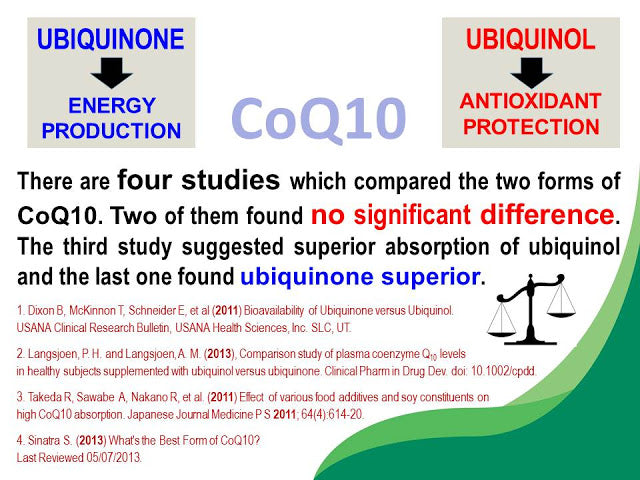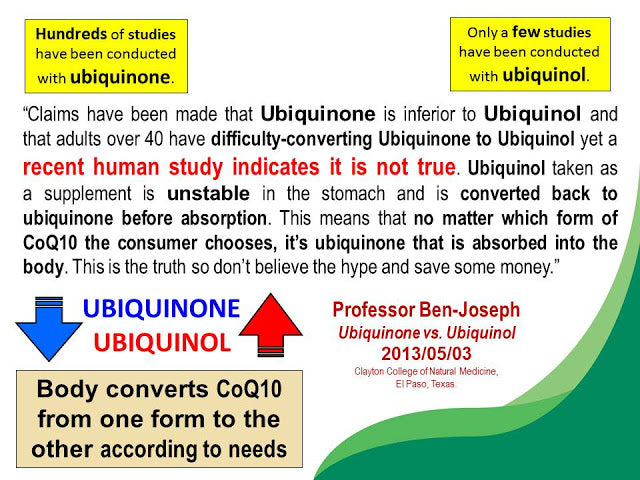Coenzyme Q10 is a member of the fat-soluble ubiquinone family of compounds. It is present in every cell in our body and is highly concentrated especially in the cells of the heart as this organ plays the main role in our body's energy supply process.
Scientific research suggest that apart from being beneficial for those who suffer from heart conditions, and high blood pressure, or low energy CoQ10 may also be helpful in strengthening our immune system or slowing the progression of Parkinson’s and gum disease (periodontal disease).

Quality and Bioavailability
Instead of using poorly absorbed dry powder the HealthAid CoQ10 200mg Capsules are formulated bydissolving Ubiquinone form of CoQ10 in oil. It is important to emphasise this fact because studies demonstrated that the potency and bioavailability (absorption) of the oil-based Ubiquinone in our body is the same as that of the very expensive Ubiquinol form of Coenzyme Q10! Unlike the HealthAid Coenzyme Q10 range other Ubiquinone formulas are often offered in the form of poorly absorbed dry powder.


Dosage
Due to the fact that we gradually lose this very important antioxidant with age and because most of us do not get enough of CoQ10 from food some experts recommend that even relatively healthy individuals under 60 should take 30mg of oil-based Ubiquinone form of CoQ10 every day.
Apart from Conergy Coenzyme Q10 30mg capsules (recommended for healthy individuals under 60) the HealthAid also provides a range of higher strength CoQ10 supplements (120mg and 200mg) which are more suitable for older individuals (over 60) or those who are on cholesterol lowering drugs such as Statins.
It is also very important to remember that taking CoQ10 with meals may significantly increase its absorption.
References
- Eurich DT, McAlister FA, Blackburn DF, et al. Benefits and harms of antidiabetic agents in patients with diabetes and heart failure: systematic review. BMJ. 2007 Sep 8;335(7618):497.
- Singh RB, Neki NS, Kartikey K, et al. Effect of coenzyme Q10 on risk of atherosclerosis in patients with recent myocardial infarction. Mol Cell Biochem. 2003 Apr;246(1-2):75-82.
- Zeb I, Ahmadi N, Nasir K, et al. Aged garlic extract and coenzyme Q10 have favorable effect on inflammatory markers and coronary atherosclerosis progression: a randomized clinical trial. J Cardiovasc Dis Res. 2012 Jul;3(3):185-90.
- Rundek, T., Naini, A., Sacco, et al (2004) ‘Atorvastatin decreases the coenzyme Q10 level in the blood of patients at risk for cardiovascular disease and stroke’, Archives of neurology., 61(6), pp.889–92.
- Dixon B, McKinnon T, Schneider E, et al (2011) Bioavailability of Ubiquinone versus Ubiquinol. USANA Clinical Research Bulletin, USANA Health Sciences, Inc. SLC, UT.
- Langsjoen, P. H. and Langsjoen, A. M. (2013), Comparison study of plasma coenzyme Q10 levels in healthy subjects supplemented with ubiquinol versus ubiquinone. Clinical Pharm in Drug Dev. doi: 10.1002/cpdd.
- Takeda R, Sawabe A, Nakano R, et al. (2011) Effect of various food additives and soy constituents on high CoQ10 absorption. Japanese Journal Medicine P S 2011; 64(4):614-20.
- http://www.greenmedinfo.com/article/combination-carnitine-coq10-and-taurine-repletes-essential-cardiac-myocyte-nutrients-and
- Belardinelli R, Mucaj A, Lacalaprice F, et al. Coenzyme Q10 and exercise training in chronic heart failure.Eur Heart J. 2006 Nov;27(22):2675-81.
- http://www.greenmedinfo.com/substance/coenzyme-q10
- http://www.lifeextension.com/Magazine/2015/4/CoQ10-Combats-Congestive-Heart-Failure/Page-01
- https://www.cdc.gov/dhdsp/data_statistics/fact_sheets/fs_heart_failure.htm
- Sinatra S. (2013) What's the Best Form of CoQ10?




